Living under the golden age of the Internet where information is easily accessible within our fingertips, it is important to be able to identify trustworthy sources. The figure below shows three different literacies of online information we should be aware of.
Media, Information and Data Literacy
Figure 1. Three Literacies
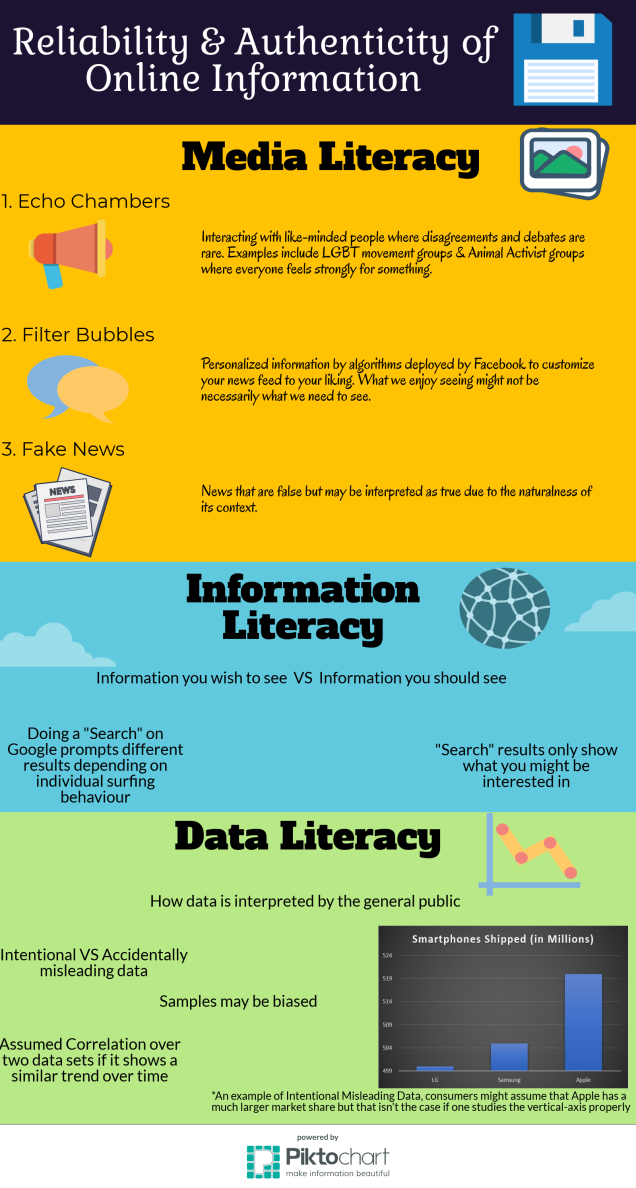
Source: Original Content
In my perspective as a student, I lean towards Media and Information Literacy. Mainly because I’m usually either browsing Social Media or conducting a web search for an assignment. With all this tweaked personalisation of information shown, it is crucial that we keep an open mind towards the information we receive.
Fake news sow confusion that obscures basic facts, thereby impeding necessary debate. – Ali Velshi at a Ted Talk
Figure 2 shows my take on different media outlets available:
Figure 2: My Media Perception
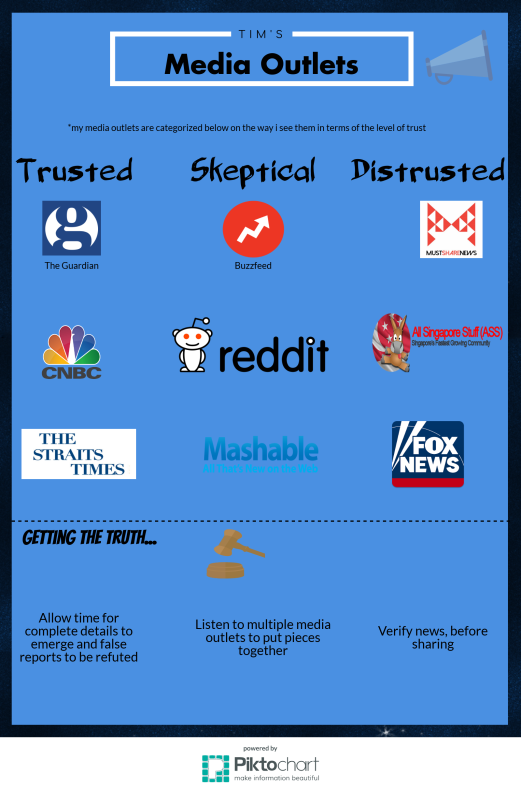
Source: Original Content
Singaporean Context…
In a Singaporean context, the two big players in the media industry are Singapore Press Holdings (SPH) and Mediacorp. Readership for SPH newspapers are at 2.6 million as of 2016, nearly half the entire population of Singapore (Nic Newman, Research Associate, 2017). Also, only 42% of Singaporeans place trust in the news they read. Figure 3 shows popular media outlets consumed in Singapore.
Figure 3: Usage of Top Media Brands
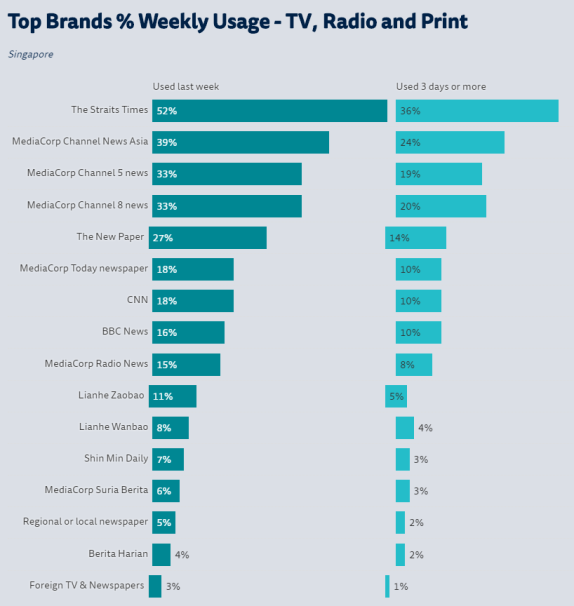
Source: Reuters Institute Digital News Report 2017
Figure 4 shows the main attributed components of media outlets in Singapore.
Figure 4: Brand Attributes
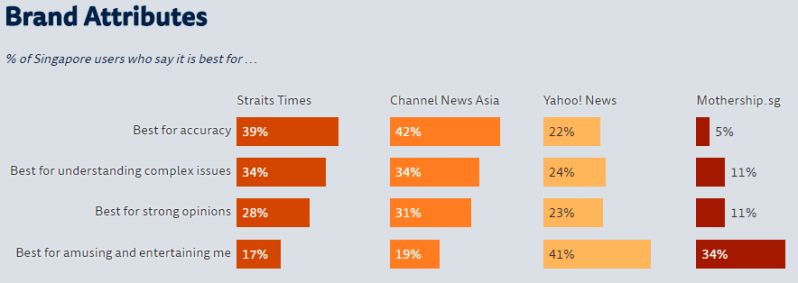
Source: Reuters Institute Digital News Report 2017
The Straits Times organized a hackathon where participants aimed to reduce impact of fake news (Yang. C, 2017). Also, a broadcasting license is required for all Internet content providers.
How do we evaluate credibility of sources?
Figure 5: Evaluating Credibility
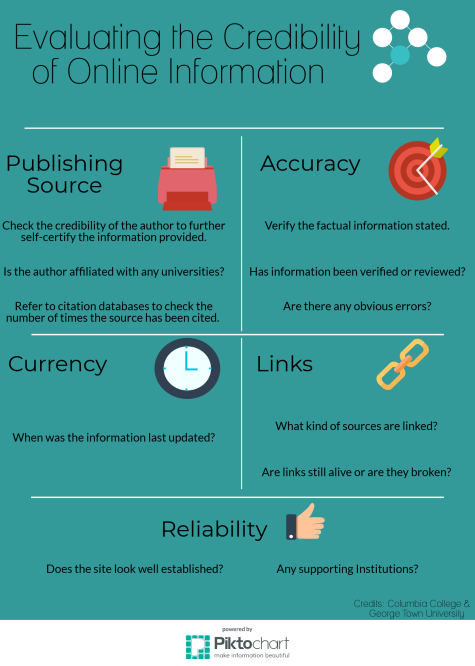
Source: Original Content with credits
I have also come with my own steps to combat inaccurate online information:
Figure 6: The 3 Os
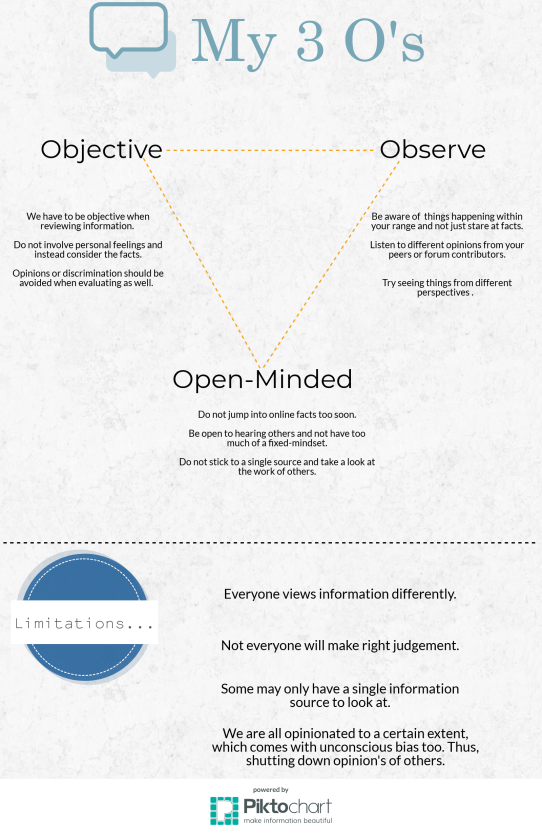
Source: Original Content
To sum it up, information is everywhere. But it is up to us to decide which are legitimate and which are false.
Word Count: 298
Can you spot fake news?
References
Posted by Nic Newman Research Associate, Reuters Institute for the Study of Journalism on May 30, 2017, and on “Singapore.” Digital News Report www.digitalnewsreport.org/survey/2017/singapore-2017
[Accessed on 15th November 2017]
Yang, C. (2017, October 14). Tertiary students come up with innovative ideas to tackle fake news. Retrieved from http://www.straitstimes.com/singapore/tertiary-students-come-up-with-innovative-ideas-to-tackle-fake-news
[Accessed on 15th November 2017]

Hi Timothy,
I read your blog and found that the addition of the Singapore media’s reliability is insightful and I’ve gain a significant level of knowledge. I think it was a great use of info-graphics to really make it a whole lot easier to visualize what you are trying to explain to readers.
I find that Singapore media is controlled as it is government-owned organisation. However, i would not label it as ‘fake news’. Neither am i saying that Singapore media is not reliable or credible. In my opinion, I feel that Singaporeans are in danger of being trapped in the filter bubble as news are filtered. Yes, there may be other sources of information but what about those who only read or trust our media?
Do you personally think that Singaporeans are trapped in the filter bubble?
Looking forward to hearing from you Tim!
Cheers!
Shaun
(147 Words)
LikeLiked by 1 person
Hi Shaun! Firstly, thank you for your kind comments. Now please allow me to address the elephant in the room. Actually, it depends on which media outlet you’re referring to. SPH is a private organisation whereas Mediacorp on the other hand, is a state-owned entity. To say that both media outlets are controlled by the government is a little flawed.
Yes regulations are set to ensure proper news reporting. But if we look at things in a wider perspective, the regulations set are to prevent disputes between the four different races in Singapore. Regulations such as to avoid talking about religion or race over air is in place to preserve harmonious beginnings we have. Yes, one might think that the government is controlling the flow of information, but if we ask ourselves, are there any events occurring in other countries that are are unaware of? I don’ think so.
A simple Google search brings us to the crisis in Barcelona, the Trump administration and also halfway across the globe where a coup in Zimbawe is taking place. Therefore, we need to be mindful that there are regulations placed in the context of new reporting in a local context, however there aren’t any search restrictions place, except for obscene items on the internet of course.
LikeLike
Hey Timothy!
Amazing infographics right there! Bright colors and cute icons with layman term that allows me to digest some crazy concept easier! Would love it if the fonts are a little bit bigger for me to read (pardon my poor eyesight alright!)
Love how you wrote in Singapore context which was much easier to relate and understand! And can I just say I love that creative part where you came out with the 3 O’s to combat inaccurate online information
Noticed how you source out the different media outlets in Singapore, but most media houses are own by Temasek Holdings so how accurate and sure are you that the news published isn’t biased towards the government?
Is it better to have a monopoly media market (so news can be controlled) or is good to have free media houses that can publish news without any control?
Would love to hear from you!
Caiying x
LikeLike
Hi Cai Ying! Thank you for kind comments. Alright, I will do something about the font size in my next topic post, thank you for the feedback.
With regards to your queries on biased news in favor of the government, I believe all news outlets are biased in one way or another. If news was as it is without the slight tweaks here and there, it wouldn’t be able to grasp the attention of readers. The news outlets are just adhering to a set of guidelines stated by the Media Development Authority (MDA) in Singapore to ensure fair and non-discriminating reporting. For example, lets say that a minister was found for corruption. The government might choose to hold back such news first before giving a detailed reporting, so as to ensure they do not unintentionally incite doubt or fear among the general public of a weak link in the government body.
Addressing your other question, I feel that having free media houses would be a better alternative, compared to having a monopoly of a media market. In Singapore, we have plenty of other small-time news outlets that does news reporting. As to why i would prefer a variety of news outlets, I’d say that having so provides us a variety of news from entertainment to comedic to political affairs. The Straits Times has more of a no-nonsense approach while other outlets like MustShareNews take a more comedic approach in her reporting. Therefore, having a variety of outlets to choose from would be great for the individual.
Cheers,
Tim
LikeLiked by 1 person